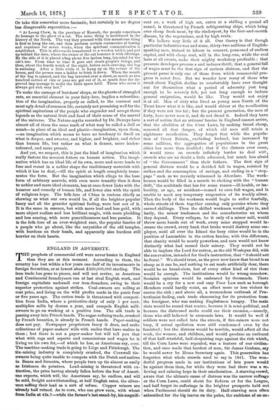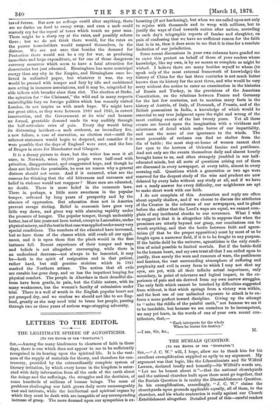ENGLAND IN ADVERSITY.
THE prophets of commercial evil were never busier in England than they are at this moment. According to them, the teruntry has lost within a few years one-half of its investments in foreign Securities, or at lowest about £400,000,000 sterling. The iron trade has gone to pieces, and will not revive, as American and Continental foundrymen can at last rival English work, and 'foreign capitalists undersell our iron-founders, owing to their 'superior protection against strikes. Coal-owners are selling at cost price, and living on the wild profits made in the panic four or five years ago. The cotton trade is threatened with competi- tion from India, where a protective-duty of only 5 per cent. multiplies mills by dozens a year, and compels English mill- owners to go on working at a positive loss. The silk trade is passing away into Frbnch hands. The sugar-refining trade, crushed by French bounties, is already in French hands. Paper-making does not pay. Newspaper proprietors fancy it does, and make collections of paper-makers' wills with smiles that have malice in them ; but there is not a paper-maker but will tell you that what with rags and esparto and commissions and wages he is living on his own fat,—of which he has, as Americans say, some. The machine-making trade is going to Liege and Pittsburgh. The tin-mining industry is completely crushed, the Cornwall tin- -owners being quite unable to compete with the Dutch and natives in Bence and Sumatra, where people turn up tin almost as easily as Irishmen do potatoes. Lead-mining is threatened with ex- tinction, the price having already fallen before the fear of Amen- tan exports, -which will, the Americans say, be endless, and will be sold, freight notwithstanding, at half English rates, the silver- 'men selling their lead as 'a sort of refuse. Copper miners are tsdready half ruined. As to corn, who can grow corn, with wheat from India at -42s-9—while the farmer's last stand-by, his rnagnifi- cent ox, a work of high art eaten at a shilling a pound all round, is threatened by French refrigerating ships, which bring over cheap fresh meat, by the rinderpest, by the foot-and-mouth disease, by the vegetarians, and by high rents.
We believe very little of it all. Our theory is that though particular industries wax and wane, thirty-two millions of English- speaking men, trained to labour in concert, possessed of endless capital, and with cheap coal, will in the long-run, while the coal lasts at all events, make their mighty workshop profitable ; that pressure developes processt s and induces thrift, that a general fall of wages must be the first sign of serious distress, and that the present pause is only one of those from which commercial pro- gress is never free. But we wonder how many of those who croak about English decline so comfortably have ever thought out for themselves what a period of adversity just long enough to be severely felt, yet not long enough to induce general emigration, would be like. They would not enjoy it at all. Men of sixty who lived as young men North of the Trent know what it is like, and would shiver at the recollection if they were not too fat ; but the present generation, the men of forty, have never seen it, and do not dread it. Indeed they have a sort of notion that an artisans' famine in England cannot arrive, that the abolition of the Corn Laws, by making bread cheap, removed all that danger, of which old men still retain a nightmare recollection. They forget that while the popula- tion of Great Britain,. excluding Ireland, has increased by some millions, the aggregation of populations in the great cities has more than doubled ; that if the distress ever came, it would come on crowds infinitely harder to deal with, crowds who are no doubt a little educated, but much less afraid of "the Government" than their fathers. The first sign of general distress would be a decided fall in wages, resisted by strikes and the consumption of savings, and ending in a " stop- page " such as we recently witnessed in Aberdare. The work- houses would be filled in a month to choking with the "human drift," the multitude that has for some reason—ill-health, or im- becility, or age, or accident—ceased to earn full wages, and is unable to meet any temporary suspension of its weekly silver. Then the body of the workmen would begin to suffer fearfully, whole streets of them together earning only pennies where they earned shillings. Then the skilled workmen would give in, and lastly, the minor tradesmen and the manufactories on whom they depend. Every collapse, be it only of a minor mill, would throw more hands out of work, every mine stopped would in- crease the crowd, every bank that broke would destroy some em- ployer, until all over the Island the busy cities would be in the position of Lancashire in the cotton famine, with this difference, that charity would be nearly powerless, and men would not know distinctly what had caused their misery. They would not he able to implore the Lord for cotton, as the old 'iVealeyan did, with the reservation, intended for God's instruction, that "it should not be Surat." We should trust, as the poor now know that bread iii418 cheap as it can be, and nothing to eat made artificially dear, there would be no bread-riots, but of every other kind of riot there would be enough. The institutions would be wrong somehow. Socialist opinions would be embraced by thousands. There would be a cry for a new and easy Poor Law such as borough Members could hardly resist, an effort more or less violent to coerce the rich ; and above all, a tremendous outbreak of Pro- tectionist feeling, each trade clamouring for its protection from the foreigner, who was making Englishmen hungry. The main riots would be round that centre, because it is semi-political, and because the distressed mobs could see their enemies,—namely, those who still believed in economic laws. It would be well if soldiers were not called into the streets, if fire-raisers were not busy, if actual spoliation were still condemned even by the famished ; but the distress would be terrible, would affect all the weak, the women, and children, and would produce an outburst of that half-wrathful, half-despairing rage against the rich which, till the Corn Laws were repealed, was a feature of our civilisa- tion, and once made that hardest of men, Sir James Graham, say he would never be Home Secretary again. This generation has forgotten what whole crowds used to say in 1841. The won- derful progress made in our institutions of late years would be against them then, for while they were bad there was a 're- lieving and calming hope in their amelioration. A starving crowd, aware that the ultimate cause of distress was the narrow suffrage or the Corn Laws, could shout for Reform or for the League, and half forget its sufferings in the brighter prospects held out when Parliament should do its duty. Half-starving men often subscribed for the big loaves on the poles, the emblems of an un-
taxed future. But now no suffrage could alter anything, there are no duties on food to sweep away, and even a mob could scarcely cry for the repeal of taxes which touch no poor man. There might be a sharp cry at the rates, and possibly reform there ; but we do not think there would, for the rates on the poorer householders would suspend themselves, in the distress. We are not sure that besides the demand for Protection there would not be a cry for war, as producing immediate and large expenditure, or for one of those dangerous currency measures which seem to have a fatal attraction for democracies but just educated. Birmingham has more municipal energy than any city in the Empire, and Birmingham once be- lieved in unlimited paper, but whatever it was, the cry would be pressed with temper and fury by idle and embittered men acting in immense associations, and it may be, misguided by able talkers with broader aims than riot. The election at Stoke, the agitation for "the Claimant," the wild and in many respects unintelligible fury on foreign politics which has recently visited London, do not inspire us with much hope. We might have our great cities, as they were between 1840 and 1845, in covert insurrection, and the Government at its wits' end because no formal, grantable demand made its way audibly through the half-articulate cries of pain. Every day would bring its distressing incident—a mob outburst, an incendiary fire, a new failure, a case of starvation, an election riot—until the soberest statesmen would begin to despond, and consider if it were possible that the days of England were over, and the fate of Bruges in store for Manchester and Glasgow.
It is a dreary picture to draw, but the writer has seen it all once, in Norwich, when 60,000 people were half-mad with privation, disappointment, and exaggerated hope, and though be does not believe the pessimists, he sees no reason why a general distress should not occur. And if it occurred, what are the reasons for thinking that the old bitterness and unreason and belief in violence would not reappear ? More men are educated, no doubt. There is more belief in the economic laws.
There is, perhaps, a little more sweetness in the popular temper, softened by long years of prosperity and by the absence of oppression. But education does not in America prevent savage rioting. Belief in economic laws goes very little way down, and gives way with alarming rapidity under the pressure of hunger. The popular temper, though undeniably better, has of late years not been tested, except in Lancashire, under physical misery, and the test in that case was applied under many very special conditions. The numbers of the educated have increased, but so have those of the classes which still evade all our appli- ances, and it is upon them that the pinch would in the first instance fall. Recent experience of their temper and ways and beliefs is not altogether encouraging, while there is an undoubted decrease—not always to be lamented, it may be—both in the spirit of resignation and in that patient, rather hard, but still genuine stoicism which in 1841 marked the Northern artisan. The notion that all evils are curable has gone deep, and so has the impatient longing for physical comfort. The people in Aberdare in their dreadful dis- tress have been gentle, to pain, but the Celtic nature, with its many weaknesses, has the woman's faculty of submission under trial. There is a well of wrath in the English popular heart not yet pumped dry, and we confess we should not like to see Eng- land, greatly as she may need trial to brace her people, passing through two or three years of serious wage-stopping adversity.



































 Previous page
Previous page